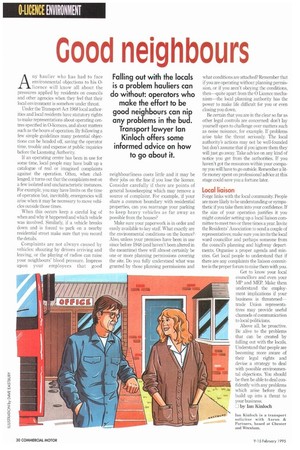Good neighbours
Page 34

If you've noticed an error in this article please click here to report it so we can fix it.
Falling out with the locals is a problem hauliers can do without: operators who make the effort to be good neighbours can nip any problems in the bud. Transport lawyer Ian Kinloch offers some informed advice on how to go about it. Any haulier who has had to face environmental objections to his 0licence will know all about the pressures applied by residents on councils and other agencies when they feel that their local environment is somehow under threat.
Under the Transport Act 1968 local authorities and local residents have statutory rights to make representations about operating cenn-es specified in 0-licences, and about matters such as the hours of operation. By following a few simple guidelines many potential objections can be headed off, saving the operator time, trouble and expense at public inquiries before the Licensing Authority.
If an operating centre has been in use for some time, local people may have built up a catalogue of real or imagined complaints against the operation. Often, when challenged, it turns out that the complaints rest on a few isolated and uncharacteristic instances. For example, you may have limits on the time of operation but, inevitably, emergencies will arise when it may be necessary to move vehicles outside those times.
When this occurs keep a careful log of when and why it happened and which vehicle was involved. Similarly, if a vehicle breaks down and is forced to park on a nearby residential street make sure that you record the details.
Complaints are not always caused by vehicles: shouting by drivers arriving and leaving, or the playing of radios can raise your neighbours' blood pressure. Impress upon your employees that good neighbourliness costs little and it may be their jobs on the line if you lose the licence. Consider carefully if there are points of general housekeeping which may remove a source of complaint. For example, if your share a common boundary with residential properties, can you rearrange your parking to keep heavy vehicles as far away as possible from the houses?
Make sure your paperwork is in order and easily available to key staff. What exactly are the environmental conditions on the licence?Also, unless your premises have been in use since before 1948 (and haven't been altered in the meantime) there will almost certainly be one or more planning permissions covering the site. Do you fully understand what was granted by those planning permissions and what conditions are attached? Remember that if you are operating without planning permission, or if you aren't obeying the conditions, then—quite apart from the 0 Licence mechanism—the local planning authority has the power to make life difficult for you or even closing you down.
Be certain that you are in the clear so far as other legal controls are concerned: don't lay yourself open to challenge over matters such as noise nuisance, for example. If problems arise take the threat seriously. The local authority's actions may not be well-founded but don't assume that if you ignore them they will just go away. Take advice on any kind of notice you get from the authorities. If you haven't got the resources within your company you will have to go outside. Remember a little money spent on professional advice at this stage could save you a fortune later.
Local liaison
Forge links with the local community. People are more likely to be understanding or sympathetic if you take them into your confidence. If the size of your operation justifies it you might consider setting up a local liaison committee to meet two or three times a year. Invite the Residents' Association to send a couple of representatives; make sure you invite the local ward councillor and perhaps someone from the council's planning and highway departments. Organise a proper agenda and minutes. Get local people to understand that if there are any complaints the liaison committee is the proper forum to raise them with you.
Get to know your local councillors and even your MP and MEP. Make them understand the employment implications if your business is threatened trade Union representatives may provide useful channels of communication to local politicians.
Above all, be proactive. Be alive to the problems that can be created by falling out with the locals. Understand that people are becoming more aware of their legal rights and devise a strategy to deal with possible environmental objections. You should be then be able to deal confidently with any problems which arise before they build up into a threat to your business.
. by Ian Kinloch


































































































